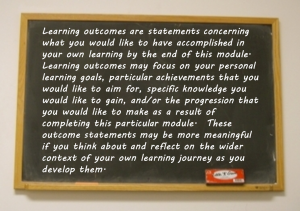In a recent post I questioned how we might frame the concept of learning outcomes (LOs) from the students’ perspective. I was interested particularly in developing a student-focused definition of LOs that goes beyond LOs simply as statements of what a student will know, understand or be able to do at the end of a learning period. In our ‘Learning Outcomes Project’ we are currently working on engaging students in developing their own LOs but for this we need a definition of LOs that represents what we are asking students to consider as LOs. And for us, student-focused LOs should connect students to the broader context of their learning in a way that encourages them to think about their wider aims and personal goals, as well as the specific types of knowledge and skills that they want to gain. In my previous post, I argued that a student-focused definition of LOs:
My continued reflections after writing this post led me to develop the following definition of LOs that would hopefully convey this broader context of learning to students and help them to develop their own LOs that will be personal and meaningful to them:
In a brainstorming session with a colleague we tinkered with this definition a little bit further until we were happy with the following final version:
Learning outcomes are statements concerning what you would like to have accomplished in your learning by the end of a module or degree programme. Learning outcomes may focus on:
- your personal learning goals
- particular achievements you would like to aim for (such as a mark or degree class)
- specific knowledge or techniques you would like to acquire
- transferable skills that could contribute to your employability
- progression towards larger learning goals.
These learning outcome statements may be more meaningful if you think about and reflect on the wider context of your own learning journey as you develop them.
Of course, the real test of this definition is whether students like it and, more importantly, whether it is meaningful for them and encourages them to engage in a meaningful learning activity. We are now in the process of carrying out just such a test with a variety of students and student groups. I can though report that our first trial of this definition with some final year students in a session a few days ago had some very pleasing results.
In the first session of a new module we introduced the students to the formal LOs for the module, then explained our interest in developing LOs in collaboration with them which would focus on their learning within the module and how that learning fits into the broader context of their courses and their personal learning goals. We reviewed our student-focused definition of LOs with them and asked if they could identify any of their own LOs in the form of personal learning goals, particular achievements they are aiming for, etc. Far from being challenging, most of the students were able to articulate some very personal and unique goals that not only related to their interests and learning experiences from other modules, but also connected to their overall ambitions and reasons for choosing the courses that they are doing. It all confirmed to me that we are on the right track with our definition and that engaging students in this kind of explicit thinking about the outcomes that they want to achieve will potentially have some powerful and positive effects for them.
I will keep readers updated about our further tests of this definition and the other activities we are conducting to explore how students can be effectively engaging in developing learning outcomes. In the meantime, I will be very interested to hear any thoughts that you may have about the definition and if you have tried it out with your own students.





 Subscribe to Kerry Dobbins's posts
Subscribe to Kerry Dobbins's posts
Recent Comments